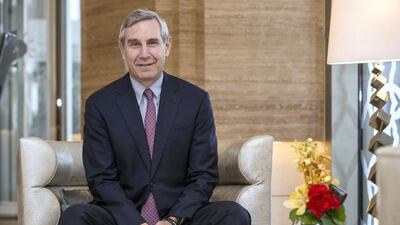Richard Edelman is in Dubai, but he is looking beyond the beach.
The president and chief executive of the biggest public relations firm in the world (although he has clear views on the changing nature of PR) has just clinched a multimillion-dollar contract with Dubai’s Department of Tourism and Commerce Marketing to handle the emirate’s crucial tourism campaign around the world.
He sees it as more than just a “sun, sea and sand” campaign. “It will be one of our biggest contracts in the Middle East, and will highlight Dubai’s growing sophistication. It is not just a beach destination any more, but is as much about food, the arts, and upmarket shopping,” he says.
In addition to Dubai’s traditional strength as a tourism magnet for Europeans and Asians, as well as regional visitors, Mr Edelman sees opportunities among his American compatriots.
“It has not really been a place for American tourists in big numbers. Americans will want retailing, fine food and the cosmopolitan feel of Dubai, so that’s how we will focus it,” he adds.
The tourism brief will also be the first real opportunity to test the strength of the merger earlier this year with Dabo & Co, the local marketing business Edelman acquired after many months of negotiation.
It is a change of emphasis for Edelman, best known in the region as an adviser to Mubadala Development, one of the big heavyweights of the Abu Dhabi business scene, and big projects in the capital such as Cleveland Clinic and New York University.
Now Edelman/Dabo will set its skills to the kind of creative, consumer-driven marketing that brought Dabo to Edelman’s attention in the first place. “The Dabo people are consumer marketing geniuses. This is exactly why we acquired them. My father started Edelman as a consumer marketing business, but in the Middle East we have until now focused on big corporate and public affairs. Now we’ve gone back to our roots in consumer PR,” says Mr Edelman.
That move is part of a rethink of some of the fundamentals of communications theory he has been considering for some time.
A year ago, in a landmark speech, Mr Edelman challenged the industry to “think about our responsibilities in a new way. I sincerely believe we must move communications into an even more mission-critical role”, he said, heralding an era of what he called “communications marketing”.
Now, he reels off the challenges the industry faces, such as ad blockers that threaten revenue streams from online advertising and “cable-cutting” that similarly endangers cash flow in the move from cable television to advertisement-free services such as Netflix.
“Advertising has always been the ‘head boy’ of the communications industry, but not any more. Now the rest – creative, digital and media – is just as important,” he says.
Edelman recently hired more than 300 creative and planning executives from the advertising industry to give the firm a more digital focus for the big brands it handles, such as Kellogg’s.
“Digital is, of course, the way forward, but it has to be integrated into all other aspects of the business,” says Mr Edelman. “For example, if you’re somebody like Disney, we can monitor Twitter feeds all the time to see if you have a genuine problem or just a couple of disgruntled customers. It makes the whole process faster and more responsive.”
There is even a new spirit of altruism about the industry, he believes. “The marketing business has been just about promoting things, but we don’t believe that any more. There has to be a societal component too,” he says.
Edelman recently announced it would no longer take on clients it deemed to be climate change deniers, or companies from the coal and other carbon-burning industries. The decision followed a six-month analysis by top consultants. “Now we’re all climate change believers,” says Mr Edelman.
The new buzzwords of the marketing communications industry are “evolve”, “promote” and “protect”, but Edelman faces a challenge to all three in Volkswagen, for which the firm holds the North America account. The German car maker is badly in need of sound communications advice in light of the ongoing scandal about its use of technology on some models to deceive emissions-detection devices.
“We worked on the testimony of Michael Horn [the chief executive of VW North America] recently,” says Mr Edelman.
“It’s work in progress, but he was contrite and apologetic. Great brands have a way of recovering and this is a phenomenal brand. It needs to re-establish the connections with its customers and prove itself a reliable partner.”
America is currently one of the bright spots of the Edelman business. “The US is the most vibrant market at the moment, followed by the UK. Germany is OK, but the rest of Europe is a struggle,” he says.
“The Middle East continues to outperform along with India, where there has been a business renaissance under the Modi government, but the other Brics [Brazil, Russia and China] are a problem. The PR business worldwide is growing at 4 per cent, but we’re doing twice that,” adds Mr Edelman in a quick tour d’horizon of the Edelman empire.
The UAE will continue to play a central role in the global set-up. Edelman has its regional headquarters in Abu Dhabi, and the UAE will be one of its new global business centres, alongside Singapore and Shanghai, to complement the existing centres in America and Britain.
“This [the UAE] is a very important part of the global agenda for us. It’s an air traffic centre, and also a gateway to other big markets, in Africa and India. And as far as I can see it’s not as petro-reliant as some other parts of the Middle East,” he adds.
fkane@thenational.ae
Follow The National's Business section on Twitter
This story was amended to correct that Richard Edelman is not the founder of his firm, Edelman. The company was founded by his father, Daniel J Edelman.

